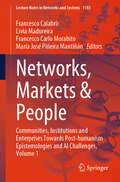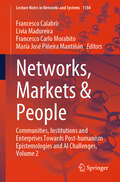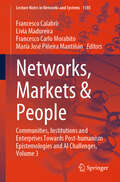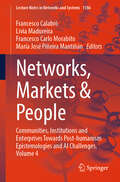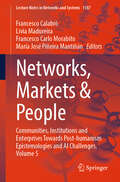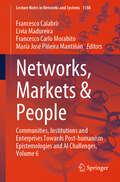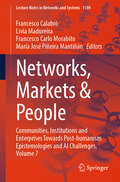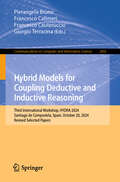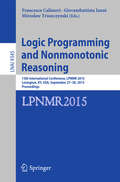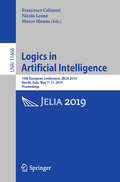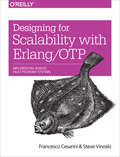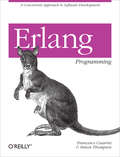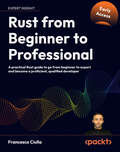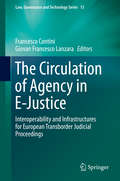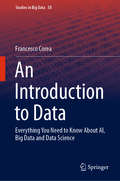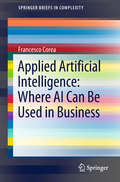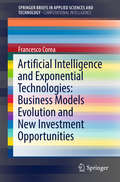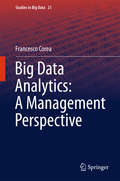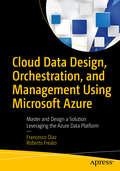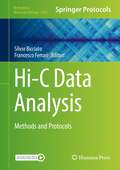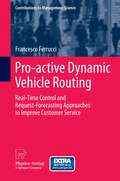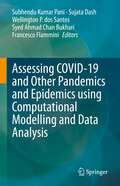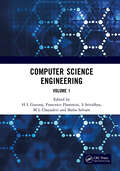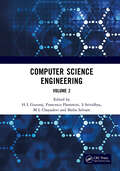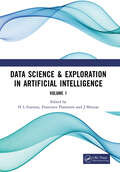- Table View
- List View
Networks, Markets & People: Communities, Institutions and Enterprises Towards Post-humanism Epistemologies and AI Challenges, Volume 1 (Lecture Notes in Networks and Systems #1183)
by Francesco Carlo Morabito Francesco Calabrò María José Piñeira Mantiñán Livia MadureiraThis book aims to address the issue of the effects that the contemporary environmental, technological, social and economic global challenges produce on settlement systems, communities, institutions and enterprises. It presents a multi-disciplinary scientific debate on the new frontiers of strategic and spatial planning, decision support tools and ecological design, within the urban-rural areas networks and the metropolitan cities of the Mediterranean basin. The book focuses on five topics: Cultural Heritage as driver of development for territories and tourism destinations; Ecosystems, people-nature cohesion and urban-rural relationships; Decision Support Systems for urban regeneration; Policies and practices of cohesion and social innovation for inclusive cities; Green buildings and sustainable solutions for ecological transition. In addition, the book hosts the papers of a special session intercluster promoted by Italian Society of Architectural Technology (SITdA). The book benefits all researchers, practitioners and policymakers interested in the issue applied to metropolitan cities and marginal areas.
Networks, Markets & People: Communities, Institutions and Enterprises Towards Post-humanism Epistemologies and AI Challenges, Volume 2 (Lecture Notes in Networks and Systems #1184)
by Francesco Carlo Morabito Francesco Calabrò María José Piñeira Mantiñán Livia MadureiraThis book aims to address the issue of the effects that the contemporary environmental, technological, social and economic global challenges produce on settlement systems, communities, institutions and enterprises. It presents a multi-disciplinary scientific debate on the new frontiers of strategic and spatial planning, decision support tools and ecological design, within the urban-rural areas networks and the metropolitan cities of the Mediterranean basin. The book focuses on five topics: Cultural Heritage as driver of development for territories and tourism destinations; Ecosystems, people-nature cohesion and urban-rural relationships; Decision Support Systems for urban regeneration; Policies and practices of cohesion and social innovation for inclusive cities; Green buildings and sustainable solutions for ecological transition. In addition, the book hosts the papers of a special session intercluster promoted by Italian Society of Architectural Technology (SITdA). The book benefits all researchers, practitioners and policymakers interested in the issue applied to metropolitan cities and marginal areas.
Networks, Markets & People: Communities, Institutions and Enterprises Towards Post-humanism Epistemologies and AI Challenges, Volume 3 (Lecture Notes in Networks and Systems #1185)
by Francesco Carlo Morabito Francesco Calabrò María José Piñeira Mantiñán Livia MadureiraThis book aims to address the issue of the effects that the contemporary environmental, technological, social and economic global challenges produce on settlement systems, communities, institutions and enterprises. It presents a multi-disciplinary scientific debate on the new frontiers of strategic and spatial planning, decision support tools and ecological design, within the urban-rural areas networks and the metropolitan cities of the Mediterranean basin. The book focuses on five topics: Cultural Heritage as driver of development for territories and tourism destinations; Ecosystems, people-nature cohesion and urban-rural relationships; Decision Support Systems for urban regeneration; Policies and practices of cohesion and social innovation for inclusive cities; Green buildings and sustainable solutions for ecological transition. In addition, the book hosts the papers of a special session intercluster promoted by Italian Society of Architectural Technology (SITdA). The book benefits all researchers, practitioners and policymakers interested in the issue applied to metropolitan cities and marginal areas.
Networks, Markets & People: Communities, Institutions and Enterprises Towards Post-humanism Epistemologies and AI Challenges, Volume 4 (Lecture Notes in Networks and Systems #1186)
by Francesco Carlo Morabito Francesco Calabrò María José Piñeira Mantiñán Livia MadureiraThis book aims to address the issue of the effects that the contemporary environmental, technological, social and economic global challenges produce on settlement systems, communities, institutions and enterprises. It presents a multi-disciplinary scientific debate on the new frontiers of strategic and spatial planning, decision support tools and ecological design, within the urban-rural areas networks and the metropolitan cities of the Mediterranean basin. The book focuses on five topics: Cultural Heritage as driver of development for territories and tourism destinations; Ecosystems, people-nature cohesion and urban-rural relationships; Decision Support Systems for urban regeneration; Policies and practices of cohesion and social innovation for inclusive cities; Green buildings and sustainable solutions for ecological transition. In addition, the book hosts the papers of a special session intercluster promoted by Italian Society of Architectural Technology (SITdA). The book benefits all researchers, practitioners and policymakers interested in the issue applied to metropolitan cities and marginal areas.
Networks, Markets & People: Communities, Institutions and Enterprises Towards Post-humanism Epistemologies and AI Challenges, Volume 5 (Lecture Notes in Networks and Systems #1187)
by Francesco Carlo Morabito Francesco Calabrò María José Piñeira Mantiñán Livia MadureiraThis book aims to address the issue of the effects that the contemporary environmental, technological, social and economic global challenges produce on settlement systems, communities, institutions and enterprises. It presents a multi-disciplinary scientific debate on the new frontiers of strategic and spatial planning, decision support tools and ecological design, within the urban-rural areas networks and the metropolitan cities of the Mediterranean basin. The book focuses on five topics: Cultural Heritage as driver of development for territories and tourism destinations; Ecosystems, people-nature cohesion and urban-rural relationships; Decision Support Systems for urban regeneration; Policies and practices of cohesion and social innovation for inclusive cities; Green buildings and sustainable solutions for ecological transition. In addition, the book hosts the papers of a special session intercluster promoted by Italian Society of Architectural Technology (SITdA). The book benefits all researchers, practitioners and policymakers interested in the issue applied to metropolitan cities and marginal areas.
Networks, Markets & People: Communities, Institutions and Enterprises Towards Post-humanism Epistemologies and AI Challenges, Volume 6 (Lecture Notes in Networks and Systems #1188)
by Francesco Carlo Morabito Francesco Calabrò María José Piñeira Mantiñán Livia MadureiraThis book aims to address the issue of the effects that the contemporary environmental, technological, social and economic global challenges produce on settlement systems, communities, institutions and enterprises. It presents a multi-disciplinary scientific debate on the new frontiers of strategic and spatial planning, decision support tools and ecological design, within the urban-rural areas networks and the metropolitan cities of the Mediterranean basin. The book focuses on five topics: Cultural Heritage as driver of development for territories and tourism destinations; Ecosystems, people-nature cohesion and urban-rural relationships; Decision Support Systems for urban regeneration; Policies and practices of cohesion and social innovation for inclusive cities; Green buildings and sustainable solutions for ecological transition. In addition, the book hosts the papers of a special session intercluster promoted by Italian Society of Architectural Technology (SITdA). The book benefits all researchers, practitioners and policymakers interested in the issue applied to metropolitan cities and marginal areas.
Networks, Markets & People: Communities, Institutions and Enterprises Towards Post-humanism Epistemologies and AI Challenges, Volume 7 (Lecture Notes in Networks and Systems #1189)
by Francesco Carlo Morabito Francesco Calabrò María José Piñeira Mantiñán Livia MadureiraThis book aims to address the issue of the effects that the contemporary environmental, technological, social and economic global challenges produce on settlement systems, communities, institutions and enterprises. It presents a multi-disciplinary scientific debate on the new frontiers of strategic and spatial planning, decision support tools and ecological design, within the urban-rural areas networks and the metropolitan cities of the Mediterranean basin. The book focuses on five topics: Cultural Heritage as driver of development for territories and tourism destinations; Ecosystems, people-nature cohesion and urban-rural relationships; Decision Support Systems for urban regeneration; Policies and practices of cohesion and social innovation for inclusive cities; Green buildings and sustainable solutions for ecological transition. In addition, the book hosts the papers of a special session intercluster promoted by Italian Society of Architectural Technology (SITdA). The book benefits all researchers, practitioners and policymakers interested in the issue applied to metropolitan cities and marginal areas.
Hybrid Models for Coupling Deductive and Inductive Reasoning: Third International Workshop, HYDRA 2024, Santiago de Compostela, Spain, October 20, 2024, Revised Selected Papers (Communications in Computer and Information Science #2492)
by Francesco Calimeri Giorgio Terracina Pierangela Bruno Francesco CauteruccioThis book constitutes the refereed proceedings of the Third International Workshop on Hybrid Models for Coupling Deductive and Inductive Reasoning, HYDRA 2024, held in Santiago de Compostela, Spain, on October 20, 2024. The 6 full papers and 1 invited talk included in this book were carefully reviewed and selected from 7 submissions.The International Workshop on Hybrid Models for Coupling Deductive andInductive Reasoning (HYDRA) was designed as a forum for researchers to explore the exciting possibilities at the intersection of deductive and inductive reasoning.
Logic Programming and Nonmonotonic Reasoning
by Francesco Calimeri Giovambattista Ianni Miroslaw TruszczynskiThis volume contains the refereed proceedings of the 13th International Conference on Logic Programming and Nonmonotonic Reasoning, LPNMR 2015, held in September 2015 in Lexington, KY, USA. The 290long and 11 short papers presented together with 3 invited talks, the paper reporting on the Answer Set Programming competition, and four papers presented by LPNMR student attendees at the doctoral consortium were carefully reviewed and selected from 60 submissions. LPNMR is a forum for exchanging ideas on declarative logic programming, nonmonotonic reasoning, and knowledge representation. The aim of the LPNMR conferences is to facilitate interactions between researchers interested in the design and implementation of logic-based programming languages and database systems, and researchers who work in the areas of knowledge representation and nonmonotonic reasoning.
Logics in Artificial Intelligence: 16th European Conference, JELIA 2019, Rende, Italy, May 7–11, 2019, Proceedings (Lecture Notes in Computer Science #11468)
by Francesco Calimeri Nicola Leone Marco MannaThis book constitutes the proceedings of the 16th European Conference on Logics in Artificial Intelligence, JELIA 2019, held in Rende, Italy, in May 2019. The 50 full papers and 10 short papers included in this volume were carefully reviewed and selected from 101 submissions. Additionally, the book contains 3 invited papers. The accepted papers span a number of areas within Logics in AI, including: belief revision and argumentation; causal, defeasible and inductive reasoning; conditional, probabilistic and propositional logic; description logics; logic programming; modal and default logic; and temporal logic.
Designing for Scalability with Erlang/OTP: Implement Robust, Fault-Tolerant Systems
by Francesco Cesarini Steve VinoskiIf you need to build a scalable, fault tolerant system with requirements for high availability, discover why the Erlang/OTP platform stands out for the breadth, depth, and consistency of its features. This hands-on guide demonstrates how to use the Erlang programming language and its OTP framework of reusable libraries, tools, and design principles to develop complex commercial-grade systems that simply cannot fail.In the first part of the book, you’ll learn how to design and implement process behaviors and supervision trees with Erlang/OTP, and bundle them into standalone nodes. The second part addresses reliability, scalability, and high availability in your overall system design. If you’re familiar with Erlang, this book will help you understand the design choices and trade-offs necessary to keep your system running.Explore OTP’s building blocks: the Erlang language, tools and libraries collection, and its abstract principles and design rulesDive into the fundamentals of OTP reusable frameworks: the Erlang process structures OTP uses for behaviorsUnderstand how OTP behaviors support client-server structures, finite state machine patterns, event handling, and runtime/code integrationWrite your own behaviors and special processesUse OTP’s tools, techniques, and architectures to handle deployment, monitoring, and operations
Erlang Programming: A Concurrent Approach to Software Development
by Francesco Cesarini Simon ThompsonThis book is an in-depth introduction to Erlang, a programming language ideal for any situation where concurrency, fault tolerance, and fast response is essential. Erlang is gaining widespread adoption with the advent of multi-core processors and their new scalable approach to concurrency. With this guide you'll learn how to write complex concurrent programs in Erlang, regardless of your programming background or experience. Written by leaders of the international Erlang community -- and based on their training material -- Erlang Programming focuses on the language's syntax and semantics, and explains pattern matching, proper lists, recursion, debugging, networking, and concurrency.This book helps you:Understand the strengths of Erlang and why its designers included specific featuresLearn the concepts behind concurrency and Erlang's way of handling itWrite efficient Erlang programs while keeping code neat and readableDiscover how Erlang fills the requirements for distributed systemsAdd simple graphical user interfaces with little effortLearn Erlang's tracing mechanisms for debugging concurrent and distributed systemsUse the built-in Mnesia database and other table storage featuresErlang Programming provides exercises at the end of each chapter and simple examples throughout the book.
Rust from Beginner to Professional: A practical Rust guide to go from beginner to expert and become a proficient, qualified developer
by Francesco CiullaDive deep into the essentials of Rust with this definitive guide that covers core programming features, techniques, and principles, setting a solid foundation for advanced system and web programming. Purchase of the print or Kindle book includes a free eBook in PDF formatKey FeaturesBoost your career by mastering Rust's unique features, from systems programming to secure web applicationsStay ahead of the curve with insights into the latest tools and frameworks within the Rust ecosystemTurn theoretical knowledge into practical expertise with engaging projects and step-by-step tutorialsBook DescriptionRust from Beginner to Professional is a deeply engaging and meticulously crafted book designed to immerse programmers into the intricate world of Rust’s core principles and sophisticated features. This book not only enhances your coding skills but also prepares you to tackle complex challenges in software development, optimizing your code for better performance and reliability. You will explore Rust’s powerful concurrency models, rigorous memory safety guarantees, and its versatile trait system. Discover the foundational elements that make Rust a standout language for developing safe and efficient applications. The book will show you how these core principles can seamlessly transition into real-world applications. You will learn how to apply Rust's capabilities to systems programming and web development, extending the reach of its safety and efficiency benefits across different programming domains. Whether it's creating low-level system components or high-performance web services, the book provides practical examples to integrate Rust effectively into a variety of projects. Elevate your coding skills and become a sought-after professional in the tech industry with this essential guide. Rust from Beginner to Professional is your definitive toolkit for mastering advanced Rust programming techniques and writing high-quality code.What you will learnThoroughly understand Rust's unique programming model and its advantages for software developmentImplement advanced features like smart pointers, concurrency, and error handling to write efficient and secure codeSeamlessly incorporate Rust into your projects, enhancing both performance and scalabilityPrepare for sophisticated development tasks in systems and web programming using RustNavigate Rust's ecosystem with the latest tools and frameworks to stay ahead in technologyWho this book is forThis book is ideal for readers with a foundational knowledge of Rust as well as experienced developers from other programming backgrounds. Whether you're starting your journey with Rust and aiming to deepen your expertise, or you're an experienced developer in languages like C++, Java, or Python transitioning to Rust, this book offers a comprehensive understanding of its core mechanics. Technical leads and software architects who aim to implement Rust in their projects will find valuable insights into enhancing performance and safety, making it a crucial addition to their professional toolkit.
The Circulation of Agency in E-Justice
by Giovan Francesco Lanzara Francesco ContiniThis book contributes to an understanding of the dynamic complexities involved in the design of e-justice applications that enable online trans-border judicial proceedings in Europe. It provides answers to critical questions with practical relevance: How should online trans-border judicial proceedings be designed in order to deliver effective and timely justice to European citizens, businesses and public agencies? How can the circulation of judicial agency across Europe be facilitated? Based on extensive research, the book explores and assesses the complex entanglements between law and technology, and between national and European jurisdictions that emerge when developing even relatively simple e-services such as those supporting the European small claims procedure and European payment orders. In addition to providing a strong theoretical framework and an innovative approach to e-justice design, this book includes case studies that are based on a common methodology and theoretical framework. It presents original empirical material on the development of e-government systems in the area of European justice. Finally, it introduces the design strategies of Maximum Feasible Simplicity and Maximum Manageable Complexity and, based on them, it proposes architectural and procedural solutions to enhance the circulation of judicial agency.
An Introduction to Data: Everything You Need to Know About AI, Big Data and Data Science (Studies in Big Data #50)
by Francesco CoreaThis book reflects the author’s years of hands-on experience as an academic and practitioner. It is primarily intended for executives, managers and practitioners who want to redefine the way they think about artificial intelligence (AI) and other exponential technologies. Accordingly the book, which is structured as a collection of largely self-contained articles, includes both general strategic reflections and detailed sector-specific information. More concretely, it shares insights into what it means to work with AI and how to do it more efficiently; what it means to hire a data scientist and what new roles there are in the field; how to use AI in specific industries such as finance or insurance; how AI interacts with other technologies such as blockchain; and, in closing, a review of the use of AI in venture capital, as well as a snapshot of acceleration programs for AI companies.
Applied Artificial Intelligence: Where AI Can Be Used In Business (Springerbriefs In Complexity Ser.)
by Francesco CoreaThis book deals with artificial intelligence (AI) and its several applications. It is not an organic text that should be read from the first page onwards, but rather a collection of articles that can be read at will (or at need). The idea of this work is indeed to provide some food for thoughts on how AI is impacting few verticals (insurance and financial services), affecting horizontal and technical applications (speech recognition and blockchain), and changing organizational structures (introducing new figures or dealing with ethical issues). <P><P> The structure of the chapter is very similar, so I hope the reader won’t find difficulties in establishing comparisons or understanding the differences between specific problems AI is being used for. The first chapter of the book is indeed showing the potential and the achievements of new AI techniques in the speech recognition domain, touching upon the topics of bots and conversational interfaces. The second and thirds chapter tackle instead verticals that are historically data-intensive but not data-driven, i.e., the financial sector and the insurance one. The following part of the book is the more technical one (and probably the most innovative), because looks at AI and its intersection with another exponential technology, namely the blockchain. Finally, the last chapters are instead more operative, because they concern new figures to be hired regardless of the organization or the sector, and ethical and moral issues related to the creation and implementation of new type of algorithms.
Artificial Intelligence and Exponential Technologies: Business Models Evolution and New Investment Opportunities (SpringerBriefs in Applied Sciences and Technology)
by Francesco CoreaArtificial Intelligence is a huge breakthrough technology that is changing our world. It requires some degrees of technical skills to be developed and understood, so in this book we are going to first of all define AI and categorize it with a non-technical language. We will explain how we reached this phase and what historically happened to artificial intelligence in the last century. Recent advancements in machine learning, neuroscience, and artificial intelligence technology will be addressed, and new business models introduced for and by artificial intelligence research will be analyzed. Finally, we will describe the investment landscape, through the quite comprehensive study of almost 14,000 AI companies and we will discuss important features and characteristics of both AI investors as well as investments. This is the "Internet of Thinks" era. AI is revolutionizing the world we live in. It is augmenting the human experiences, and it targets to amplify human intelligence in a future not so distant from today. Although AI can change our lives, it comes also with some responsibilities. We need to start thinking about how to properly design an AI engine for specific purposes, as well as how to control it (and perhaps switch it off if needed). And above all, we need to start trusting our technology, and its ability to reach an effective and smart decision.
Big Data Analytics: A Management Perspective (Studies in Big Data #21)
by Francesco CoreaThis book is about innovation, big data, and data science seen from a business perspective. Big data is a buzzword nowadays, and there is a growing necessity within practitioners to understand better the phenomenon, starting from a clear stated definition. This book aims to be a starting reading for executives who want (and need) to keep the pace with the technological breakthrough introduced by new analytical techniques and piles of data. Common myths about big data will be explained, and a series of different strategic approaches will be provided. By browsing the book, it will be possible to learn how to implement a big data strategy and how to use a maturity framework to monitor the progress of the data science team, as well as how to move forward from one stage to the next. Crucial challenges related to big data will be discussed, where some of them are more general - such as ethics, privacy, and ownership - while others concern more specific business situations (e. g. , initial public offering, growth strategies, etc. ). The important matter of selecting the right skills and people for an effective team will be extensively explained, and practical ways to recognize them and understanding their personalities will be provided. Finally, few relevant technological future trends will be acknowledged (i. e. , IoT, Artificial intelligence, blockchain, etc. ), especially for their close relation with the increasing amount of data and our ability to analyse them faster and more effectively.
Cloud Data Design, Orchestration, and Management Using Microsoft Azure: Master and Design a Solution Leveraging the Azure Data Platform
by Roberto Freato Francesco DiazUse Microsoft Azure to optimally design your data solutions and save time and money. Scenarios are presented covering analysis, design, integration, monitoring, and derivatives.This book is about data and provides you with a wide range of possibilities to implement a data solution on Azure, from hybrid cloud to PaaS services. Migration from existing solutions is presented in detail. Alternatives and their scope are discussed. Five of six chapters explore PaaS, while one focuses on SQL Server features for cloud and relates to hybrid cloud and IaaS functionalities.What You'll LearnKnow the Azure services useful to implement a data solutionMatch the products/services used to your specific needsFit relational databases efficiently into data designUnderstand how to work with any type of data using Azure hybrid and public cloud featuresUse non-relational alternatives to solve even complex requirementsOrchestrate data movement using Azure servicesApproach analysis and manipulation according to the data life cycleWho This Book Is ForSoftware developers and professionals with a good data design background and basic development skills who want to learn how to implement a solution using Azure data services
Hi-C Data Analysis: Methods and Protocols (Methods in Molecular Biology #2301)
by Silvio Bicciato Francesco FerrariThis volume details a comprehensive set of methods and tools for Hi-C data processing, analysis, and interpretation. Chapters cover applications of Hi-C to address a variety of biological problems, with a specific focus on state-of-the-art computational procedures adopted for the data analysis. Written in the highly successful Methods in Molecular Biology series format, chapters include introductions to their respective topics, lists of the necessary materials and reagents, step-by-step, readily reproducible laboratory protocols, and tips on troubleshooting and avoiding known pitfalls.Authoritative and cutting-edge, Hi-C Data Analysis: Methods and Protocols aims to help computational and molecular biologists working in the field of chromatin 3D architecture and transcription regulation.
Pro-active Dynamic Vehicle Routing
by Francesco FerrucciThis book deals with transportation processes denoted as the Real-time Distribution of Perishable Goods (RDOPG). The book presents three contributions that are made to the field of transportation. First, a model considering the minimization of customer inconvenience is formulated. Second, a pro-active real-time control approach is proposed. Stochastic knowledge is generated from past request information by a new forecasting approach and is used in the pro-active approach to guide vehicles to request-likely areas before real requests arrive there. Various computational results are presented to show that in many cases the pro-active approach is able to achieve significantly improved results. Moreover, a measure for determining the structural quality of request data sets is also proposed. The third contribution of this book is a method that is presented for considering driver inconvenience aspects which arise from vehicle en-route diversion activities. Specifically, this method makes it possible to restrict the number of performed vehicle en-route diversion activities.
Assessing COVID-19 and Other Pandemics and Epidemics using Computational Modelling and Data Analysis
by Francesco Flammini Sujata Dash Subhendu Kumar Pani Wellington P. dos Santos Syed Ahmad Chan BukhariThis book comprehensively covers the topic of COVID-19 and other pandemics and epidemics data analytics using computational modelling. Biomedical and Health Informatics is an emerging field of research at the intersection of information science, computer science, and health care. The new era of pandemics and epidemics bring tremendous opportunities and challenges due to the plentiful and easily available medical data allowing for further analysis. The aim of pandemics and epidemics research is to ensure high-quality, efficient healthcare, better treatment and quality of life by efficiently analyzing the abundant medical, and healthcare data including patient’s data, electronic health records (EHRs) and lifestyle. In the past, it was a common requirement to have domain experts for developing models for biomedical or healthcare. However, recent advances in representation learning algorithms allow us to automatically learn the pattern and representation of the given data for the development of such models. Medical Image Mining, a novel research area (due to its large amount of medical images) are increasingly generated and stored digitally. These images are mainly in the form of: computed tomography (CT), X-ray, nuclear medicine imaging (PET, SPECT), magnetic resonance imaging (MRI) and ultrasound. Patients’ biomedical images can be digitized using data mining techniques and may help in answering several important and critical questions related to health care. Image mining in medicine can help to uncover new relationships between data and reveal new and useful information that can be helpful for scientists and biomedical practitioners. Assessing COVID-19 and Other Pandemics and Epidemics using Computational Modelling and Data Analysis will play a vital role in improving human life in response to pandemics and epidemics. The state-of-the-art approaches for data mining-based medical and health related applications will be of great value to researchers and practitioners working in biomedical, health informatics, and artificial intelligence..
Computer Science Engineering: Proceedings of the 1st International Conference on Computing and Intelligent Information Systems (ICCIIS 2024), Bangalore, India, 19-20th April, 2024 Volume 1
by Francesco Flammini H. L. Gururaj S. Srividhya M. L. Chayadevi Sheba SelvamThis book provides a comprehensive overview of the latest advancements and research in the fields of computing and intelligent information systems. It compiles cutting-edge studies, innovative methodologies, and practical applications presented at the conference ICCIIS 2024.The book delves into several core areas of modern computing and intelligent information systems. Key topics include artificial intelligence, exploring machine learning algorithms and neural networks; information systems and robotic process automation, highlighting efficient business process automation strategies; and signal, image, and video processing, focusing on innovative techniques for multimedia analysis. Big data analytics is also covered with insights into data mining and predictive analytics. Cloud computing and cybersecurity are explored, emphasizing secure, scalable solutions for data storage and protection. The Internet of Things (IoT) is examined for its impact on interconnected devices and smart systems. Additionally, the book explores advanced computing and intelligent networks, addressing the development of high-performance computing systems and sophisticated network architectures.This book is intended for academics, researchers, and professionals in the fields of computing and information systems, as well as students pursuing advanced studies in these areas. It is also a valuable resource for industry practitioners seeking to stay abreast of the latest trends and innovations in AI, big data, and cybersecurity.
Computer Science Engineering: Proceedings of the 1st International Conference on Computing and Intelligent Information Systems (ICCIIS 2024), Bangalore, India, 19-20th April, 2024 Volume 2
by Francesco Flammini H. L. Gururaj S. Srividhya M. L. Chayadevi Sheba SelvamThis book provides a comprehensive overview of the latest advancements and research in the fields of computing and intelligent information systems. It compiles cutting-edge studies, innovative methodologies, and practical applications presented at the conference ICCIIS 2024.The book delves into several core areas of modern computing and intelligent information systems. Key topics include artificial intelligence, exploring machine learning algorithms and neural networks; information systems and robotic process automation, highlighting efficient business process automation strategies; and signal, image, and video processing, focusing on innovative techniques for multimedia analysis. Big data analytics is also covered with insights into data mining and predictive analytics. Cloud computing and cybersecurity are explored, emphasizing secure, scalable solutions for data storage and protection. The Internet of Things (IoT) is examined for its impact on interconnected devices and smart systems. Additionally, the book explores advanced computing and intelligent networks, addressing the development of high-performance computing systems and sophisticated network architectures.This book is intended for academics, researchers, and professionals in the fields of computing and information systems, as well as students pursuing advanced studies in these areas. It is also a valuable resource for industry practitioners seeking to stay abreast of the latest trends and innovations in AI, big data, and cybersecurity.
Data Science & Exploration in Artificial Intelligence: Proceedings of the First International Conference On Data Science & Exploration in Artificial Intelligence (CODE-AI 2024) Bangalore, India, 3rd- 4th July, 2024 (Volume 1)
by Francesco Flammini H. L. Gururaj J. ShreyasThe book captures the essence of the International Conference on Data Science & Exploration in Artificial Intelligence and offers a comprehensive exploration of cutting-edge research in AI, data science, and their applications.It covers a wide array of topics including advanced Data Science, IoT, Security, Cloud Computing, Networks, Security, Image, Video and Signal Processing, Computational Biology, Computer and Information Technology. It highlights innovative research contributions and practical applications, offering readers a detailed understanding of current trends and challenges. The findings emphasize the role of global collaboration and interdisciplinary approaches in pushing the boundaries of AI and data science. Selected papers published by Taylor and Francis showcase pioneering work that is shaping the future of these fields.This is an ideal read for AI and data science researchers, industry professionals, and students seeking to stay updated on the latest advancements and ethical considerations in these areas.
